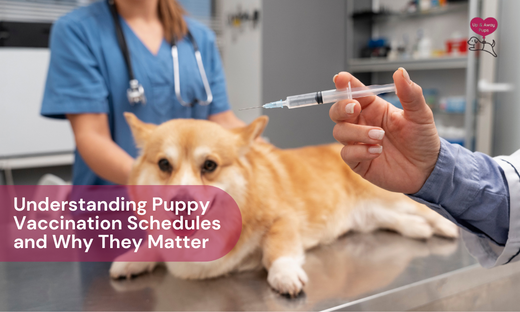Understanding Puppy Vaccination Schedules and Why They Matter
Understanding puppy vaccination schedules is vital for ensuring your dog’s health and safety. Core vaccines like rabies and distemper protect against serious diseases, while optional vaccines address specific risks based on your puppy’s lifestyle and environment. Following a vet-approved schedule helps maintain immunity and prevents common health issues. Puppies typically require 4–5 core vaccines in their first year, with boosters for continued protection. Regular vet visits ensure your furry friend stays happy, healthy, and well-protected throughout their life.
Bringing a puppy into your life is simultaneously super exciting and stressful. This adorable little being is now completely dependent upon you, at least for a substantial amount of time. For love, for entertainment, for care, and for health. As a new pet parent getting their first designer dog or an experienced individual adopting a senior dog, it becomes your obligation to ensure your little friend stays happy and healthy. One of the very first things that one should do after getting a puppy is to visit the vet and get a puppy vaccination schedule. In this blog post, we’ll understand the relevance of these schedules and the value of vaccines.
Why Vaccinate Your Puppy
Post the Covid-19 pandemic, a ton of anti-vaccine rhetoric has been created that advocates for not taking vaccines. However, vaccines aren’t just “recommendations” from doctors, they’re absolutely necessary to both keep yourself and your dog happy and healthy.
For example, rabies is 100% fatal once symptoms appear, and it can be transmitted to humans, making it a serious public health concern. However, thanks to modern healthcare, puppies are typically vaccinated against rabies as part of their regular puppy vaccination schedule. Studies have shown that rabies vaccines cause no adverse reactions and generate antibodies against the virus as intended.
Vaccines aren’t magic. The concept behind them, broken down, is quite simple. Vaccines expose a dog’s, or a human for that matter, immune system to an inactive strain of a virus, like rabies. This promotes the body’s immune system to activate and start building immune cells to fight against this foreign threat.

Vaccines have greatly reduced the number of diseases, infections, and viruses that humans and our furry friends suffered from throughout most of mankind’s history. And modern vaccines are not only affordable but almost painless.
Core Vaccines
Core vaccines, as the name might lead you to believe, are a core part of the vaccination schedule given to all dogs, no matter if have a Teacup Poodle or Cavapoo. If you’re wondering what shots puppies need, core vaccines are the ones that must be given to them, both for their health and the fact that it is required by law in most places. These include:
Rabies: As we discussed above, this vaccine protects against rabies, a virus that is deadly for dogs and humans. Getting your furry friend a rabies shot is mandated by law.
Distemper: Distemper is a viral infection that can affect a dog’s respiratory, gastrointestinal, and nervous systems. It can be fatal, so vaccination is part of the core category.
Parvovirus: Parvo is a highly contagious and severe disease that attacks a dog’s intestines. It can lead to dehydration and death if not treated quickly.
Adenovirus (Hepatitis): This virus affects the liver and can cause severe illness or even death. The vaccine protects against both canine hepatitis and respiratory infections caused by adenovirus.
These core vaccines are typically given to puppies starting at 6 to 8 weeks of age, with booster shots as they grow. Most dogs will need these vaccines throughout their lives to stay protected. If you find yourself asking the question ‘what shots do puppies need”, the answer is the ones included within the Core Vaccines category.
Optional Vaccines
Unlike core vaccines, optional vaccines, also referred to as non-core vaccines, aren’t mandated by law enforcement. These vaccines are recommended by vets based on various factors such as a dog’s breed, geographical location, lifestyle, and exposure to risks. They build immunity against specific diseases that aren’t widespread.
Non-core vaccines are recommended based on factors such as your dog's lifestyle, location, and potential exposure risks. They provide additional protection against specific diseases that might not be a concern everywhere.
Some of the optional vaccines include:
Bordetella (Kennel Cough): This vaccine protects against a highly contagious respiratory disease, often spread in places with many dogs, like kennels or dog parks.
Leptospirosis: A bacterial infection that affects a dog’s kidneys and liver. It is spread via contaminated water so dogs that often go near lakes and ponds or live in an area with not-so-clean water may potentially need to get this vaccin.e
Lyme Disease: This vaccine is for dogs who are at risk of getting Lyme disease from ticks, particularly in areas where ticks are common such as northeastern United States, mid-Atlantic, and upper-Midwest regions
Canine Influenza: This vaccine protects against dog flu, which is contagious and can cause respiratory issues and is given to dogs that often hang out with other dogs.
Puppy Vaccination Schedule
Before we begin, please note: The following puppy vaccine schedule chart is generalized. Your veterinarian may adjust it based on your puppy's health, breed, environment, and lifestyle. So, make sure to always consult with your vet before giving your puppy a vaccine and determining how often they must get it.
Guidelines provided by The World Small Animal Veterinary Association (WSAVA) show that the vaccination process should start at the age of 6-8 weeks, and core vaccines must be administered to all animals.
Now, without further ado, here is what a general puppy vaccination schedule looks like:
6–8 Weeks:
Distemper, Adenovirus (Hepatitis), Parainfluenza, Parvovirus (DHPP): A 4-1 vaccine that protects against the stated diseases.
9–11 Weeks:
DHPP Booster: A second dose to strengthen immunity.
12–15 Weeks:
DHPP Booster: A third dose to ensure strong protection.
Rabies: Required by law in many areas.
16–18 Weeks:
DHPP Booster: Final booster in the initial series.
12–16 Months:
DHPP Booster: Annual booster to maintain immunity.
Rabies Booster: Frequency depends on local regulations.
Optional Vaccines:
Leptospirosis: Recommended if your puppy is at risk due to lifestyle or environment.
Lyme Disease: Considered if you live in an area where Lyme disease is common.
Canine Influenza: Recommended if your puppy is at risk.
Bordetella Booster: If your puppy was vaccinated earlier and is at continued risk.
Their booster shots need to also be administered.

Remember that this schedule cannot be treated as medical advice, so visit your vet, and make the visit regular in order to monitor the health of your pup as well as discuss additional vaccinations and how best to administer them.
How Many Shots Do Puppies Need
For core vaccines, puppies usually require 4–5 core vaccine appointments during their first year and if you include optional vaccines, the number can potentially go up to 6-8 vaccines.
Conclusion
Vaccinations are paramount for keeping your puppy healthy and safe from common diseases that are absolutely curable. Stay consistent with the puppy vaccination schedule; missing one is not recommended, as missing too many appointments can lead to having to start the vaccination cycle from scratch.
FAQs
At what age should a puppy be vaccinated?
The recommended age at which a puppy should be vaccinated is 6–8 weeks.
What is the 45-day puppy vaccination?
The 45-day puppy vaccination refers to the very first round of core vaccines that are given at 6 weeks of age. It protects against diseases like distemper, parvovirus, adenovirus, and parainfluenza. This shot helps build initial immunity as maternal antibodies fade. Until the dog reaches 16 weeks of age, booster shots are given every 3–4 weeks.
What is the 7-in-1 vaccine for dogs?
The 7-in-1 vaccine for dogs is a combination shot that protects against seven diseases: distemper, adenovirus (types 1 and 2), parvovirus, parainfluenza, and two strains of leptospirosis.
How much do puppy shots cost?
The cost of puppy vaccine shots varies based on location, the vet clinic, and the specific vaccines. In the US, for example, the rabies vaccine costs $15–$25.
What are the most essential puppy vaccines?
All vaccines are important, but the vaccine category of “core vaccines” includes those that every animal, dog or not, should be administered with.


